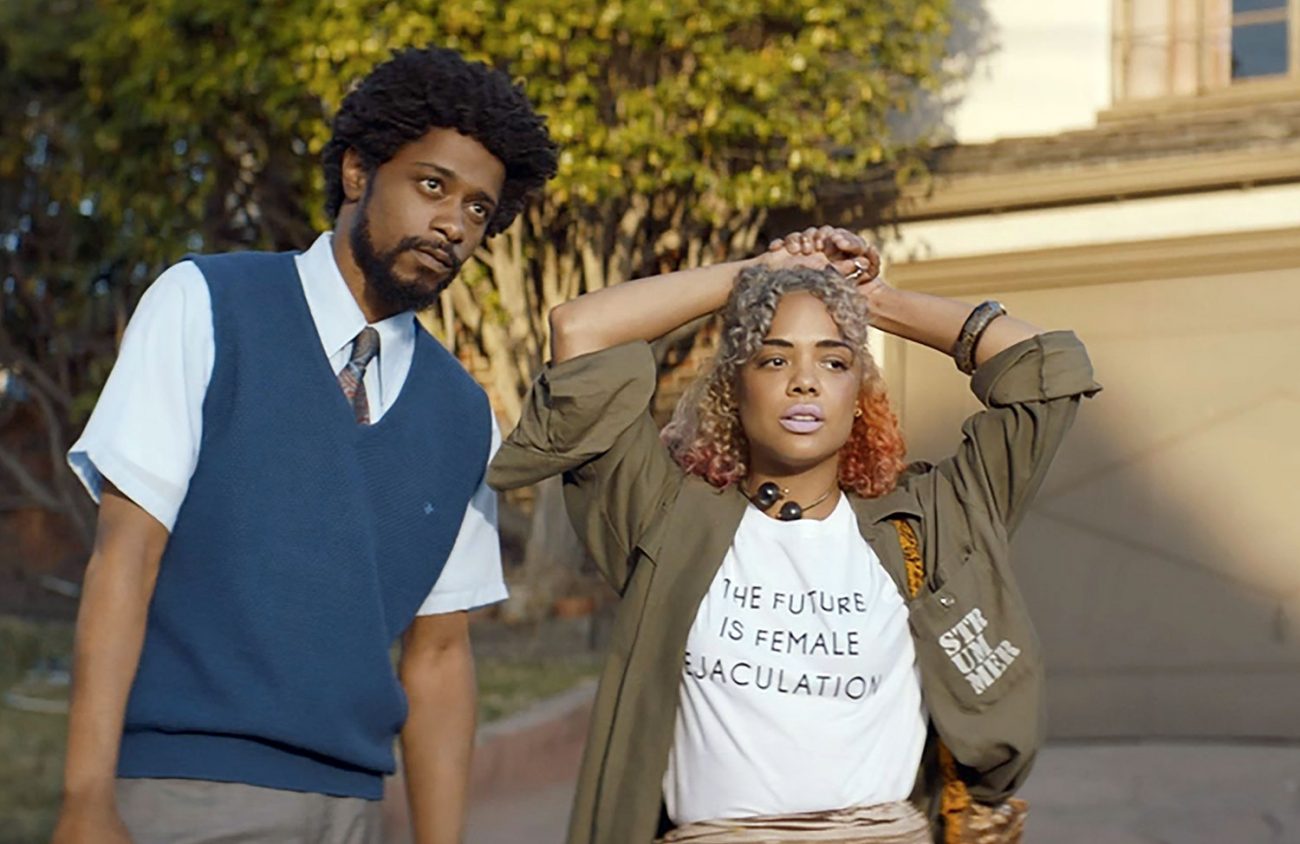Boots Riley’s debut movie is an outrageous and glorious mess. Its sympathies are intrinsically Marxist, but the aesthetics of Sorry to Bother You are a splatter-blast of this and that, born of desperation and, more important, a kind of embattled, abundant joy: absurdist comedy, dystopian sci-fi, dark satire, hipster shrug, ironic spoof, blaxploitation and dead-serious social realism.
Makes sense. Riley, for all his antic clowning and aggressive cool as an artist, is after big game in Sorry to Bother You — namely, the beast of late consumer capitalism, which is like trying to catch a greased pig in a corn maze.
Written and directed by Riley (whose other day job is fronting his band The Coup), Sorry to Bother You tells the story of Cassius “Cash” Green (Lakeith Stanfield, of Atlanta fame), a disenfranchised Oakland guy living with his girlfriend, Detroit (Tessa Thompson), in his uncle’s garage. Eventually, Cash lands a job at RegalView, a huge telemarketing firm, where an older co-worker (Danny Glover) urges him to use his “white voice” — not that nasally one like Ned Flanders, mind you, but the voice (of comedian David Cross) that oozes the supreme confidence of the ruling class.
That scene alone, scathingly funny in its layered implications of pantomimed privilege, makes the whole movie worth watching. But, seriously, things are only beginning to take off at this point. Channeling the existential refractions of Spike Jonze (Being John Malkovich) as well as the barbed surrealism of Terry Gilliam, Riley sends his movie right off the rails, creating a kaleidoscopic descent into the unreal (and yet hyper-real) nightmare of modern capitalism, American style.
It’s a wild ride, to say the least — entertaining, exasperating and convicting. At the center of it all, and creating the centripetal pull of a Death Star, is the fictional corporation WorryFree, an Amazon-like global entity that offers lifetime enslavement (housing and meals included!) as a kind of freedom from daily struggle. As Cash’s excellent white voice rockets him into the upper realms of international trafficking (arms and humans, mostly) for WorryFree, his girlfriend and her radical cohorts of “The Left Eye” wage revolutionary action against the company, which may or may not be genetically engineering “equisapiens,” a new, more durable breed of humanoid workers.
Anchored by his working-class angst, Riley takes broad aim at the slippery target of 21st-century capitalism, that hydra-headed dynamo with its endless powers of absorbing dissent and selling it back to the disaffected masses as neutered heroism. Gone are the days when bulging bags of cash bought robber barons the land and resources they craved; Riley’s film focuses on the ways power and prestige have become seductions in themselves — cashless complications that work to obscure the blunt exploitation at the heart of class warfare.
The joke, of course, is that Cash himself just keeps asking for the cash, whenever he’s confronted with some new enticement to rise in the ranks of WorryFree. Caught between Detroit’s increasingly radical activism and the coke-fueled seductions of WorryFree’s CEO (Armie Hammer at his smarmiest), Cash is the modern everyman, muddling about at ground zero of the post-millennial dilemma: sell-out to evil, or eat shit. Or, just maybe, risk it all and resist.
Sorry to Bother You isn’t a perfect film. Due to the sheer magnitude of the ideas and elements he introduces, Riley runs into some pacing problems, at times slowing down when he should speed up, and visa versa. The sexual intrigues — a standard element of classic dystopia — only get in the way here, and come across as an afterthought.
That said, the film is omnivorously intelligent and wildly entertaining, which is even more impressive when you consider the compound despair it takes on. Riley’s greatest achievement is that he confronts the commodity fetishism of capitalism — the dark animism that turns people into things and things into people — with his own version of magical realism, unmasking the endless wizardry that seeks to obscure the inequality of rich to poor, boss to worker. His excess works as a form of inoculation, defeating madness with more madness. (Opens Aug. 3 at Bijou Arts Cinema.)
